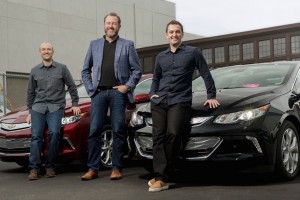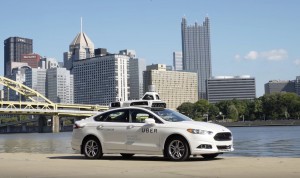
Lyft co-founder John Zimmer, right, suggests that car ownership could be extinct in large cities by 2025.
The idea or concept of privately owned cars in trucks is headed for history’s scrap heap, according to the co-founder of the ride-sharing service Lyft.
John Zimmer, Lyft’s co-founder, predicted in a blog post this week that private ownership of cars could disappear from some major cities as soon as 2025. He noted that the what it costs to own a car, i.e. fuel, maintenance, insurance, parking, etc., is just more than some folks want to deal with.
“As a country, we’ve long celebrated cars as symbols of freedom and identity. But for many people — especially millennials — this doesn’t ring true. We see car ownership as a burden,” he wrote, observing that statistics show that for the average American the cost of car ownership runs approximately $9,000.
“The car has actually become more like a $9,000 ball and chain that gets dragged through our daily life. Owning a car means monthly car payments, searching for parking, buying fuel and dealing with repairs,” he added.
Zimmer said ride-sharing has already begun to “empower” many people to live without owning a car.
“The age of young people with driver’s licenses has been steadily decreasing ever since right around when I was born. In 1983, 92% of 20- to 24-year-olds had driver’s licenses. In 2014 it was just 77%. In 1983, 46% of 16-year-olds had licenses. Today it’s just 24%. All told, a millennial today is 30% less likely to buy a car than someone from the previous generation,” he said.
(With autonomous guidelines, feds take step toward transportation revolution. Click Here for details.)
“Every year, more and more people are concluding that it is simpler and more affordable to live without a car. And when networked autonomous vehicles come onto the scene, below the cost of car ownership, most city-dwellers will stop using a personal car altogether,” Zimmer wrote.
Zimmer’s predictions come at a time when the future of transportation is being intensely debated. Just this week, the White House announced new rules for testing autonomous vehicles and Ford Motor Co. is now saying it will have a fleet of autonomous vehicles ready for the road by the start of the next decade.
However, General Motors, Lyft’s new partner, also said this week it expects to have a bright future and while it continues to invest in new ventures, it’s also clearly expects to keep its traditional business model alive into the future by winning “customers” for life.
(Click Here for more on Uber’s autonomous test program.)
Lyft’s competitor, Uber, is in the midst of testing a driverless fleet in Pittsburgh based on Zimmer’s premise that car ownership is going to decline, and that autonomous ride-sharing fleets will be the most efficient – and profitable – solution to getting from Point A to Point B and back again.
Zimmer, however, also said he expects the “Third Revolution” in Transportation to have profound impact on the urban and suburban areas that now most set aside large swath of land to accommodate cars and trucks.
“Even if you don’t care about cars — even if you never step into a Lyft or an autonomous vehicle — these changes are going to transform your life. Because transportation doesn’t just impact how we get from place to place. It shapes what those places look like, and the lives of the people who live there,” Zimmer said.
(For more on Lyft CEO Zimmer’s plans and predictions, Click Here.)
Zimmer suggested the end of private car ownership means we’ll have far fewer cars sitting parked and empty. “And that means we’ll have the chance to redesign our entire urban fabric. Taken together, this urban reimagination has the opportunity to deliver one of the most significant infrastructure shifts we have ever undertaken as a nation. And the good news is that we have to make these investments anyway,” he added.


GM’s Maven has the interesting idea of fleets of vehicles available to residents of apartment buildings, which makes sense. Who wants to deal with having a car in a city? But it’s too broad a prediction to say that “no one” will privately own cars in certain cities by 2025
Frankly, I believe that “I don’t own a car” scenario is already upon us in many large city areas. I don’t think that very many city apartment dwellers in places like New York City, Chicago, or many other densely populated urban areas own a car. Public transportation, taxicabs and services like Uber and Lyft can pretty much serve the necessary transportation of most of these folks.
Is this Zimmer guy Musks’ twin? He sounds as confident and as arrogant.